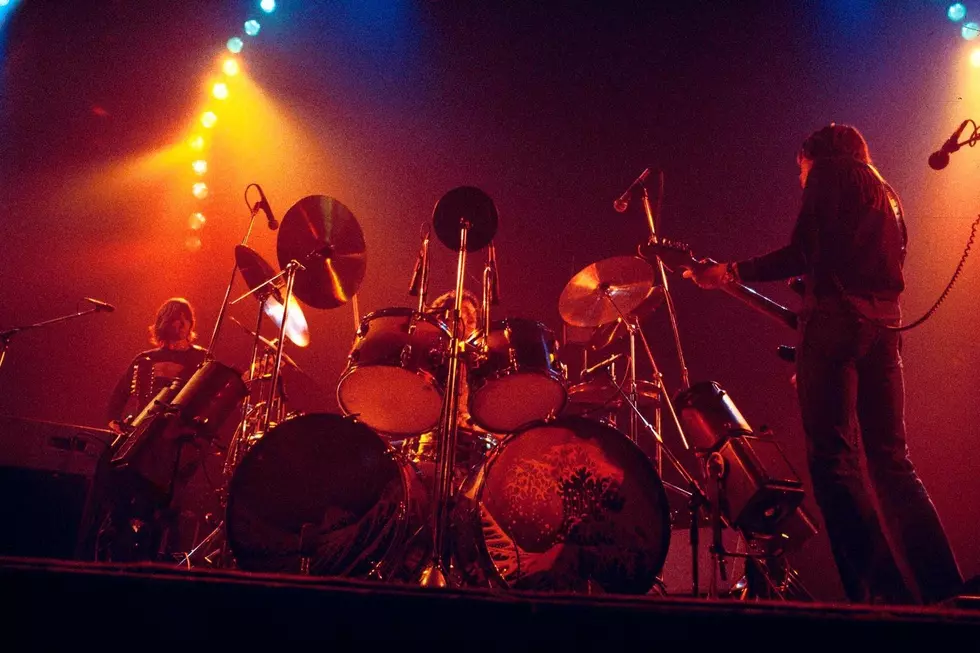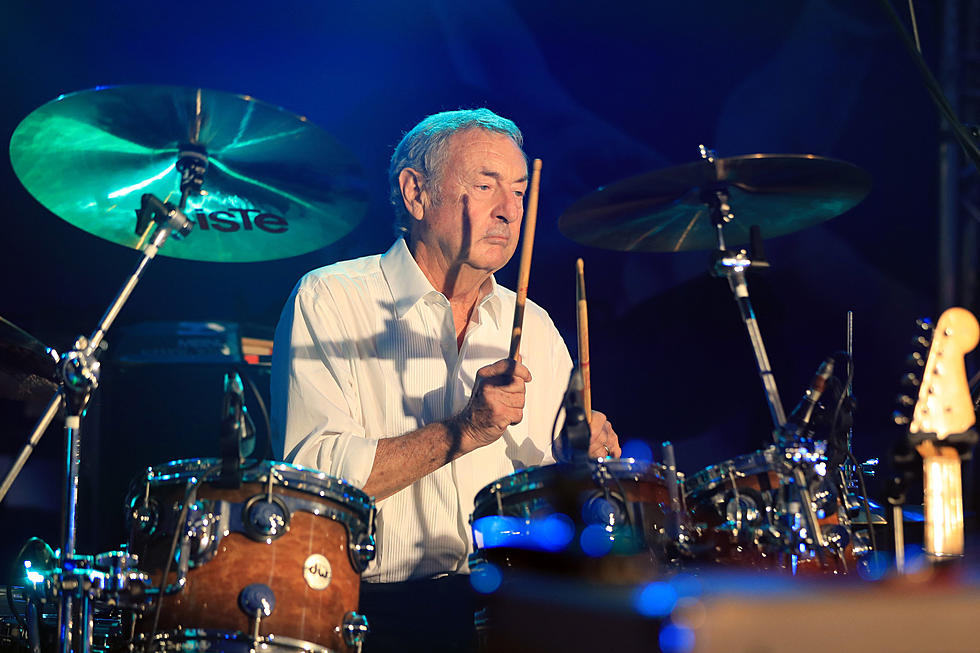
How Pink Floyd Faced Down Challenges on ‘Animals’: Exclusive Interview
Animals is one of the more intriguing albums from Pink Floyd, but it's acquired a bit of a cult status compared to mammoth entries like The Dark Side of the Moon and The Wall.
A perhaps needed opportunity for re-evaluation arrives with their newly remixed version of the LP. This reissue was actually completed in 2018, but took some time to see release due to verbal scuffling between David Gilmour and Roger Waters over liner notes for the set.
"The good thing about that is, I have no recollection now what they were arguing about," Pink Floyd's Nick Mason tells UCR with a chuckle.
The mild-mannered drummer was similarly casual in tone as he spent time discussing memories of the period, which saw Pink Floyd recording in a whole new way. Mason is also digging through the band's early archives as the next round of touring with his Saucerful of Secrets project commences later this month.
What sort of revelations did going back to Animals bring out for you personally?
I think Animals is interesting. On the technical side of all the albums we’ve made, this was perhaps the roughest one, for all sorts of reasons. The sociology of it, [Animals] was made at the same time that punk was kicking off. But the first thing about it was the fact that this was our own studio that had been built on a budget. All of our previous recording had been done at Abbey Road, AIR [Studios] or somewhere where [they had] really, the very, very highest standards. The equipment was good [at our studio] but it was not as good. So there was a very different approach in a way, to the high-fidelity aspect of it. In some ways, it’s not a bad thing, but in another way, it justifies the remix and the remastering.
You mentioned that technically, this was the roughest one, perhaps. How did that feed into the album itself?
I think it probably helped. It was a very different way of working to what we’d done before. It would have been almost pointless to take over the mixing desk at Abbey Road, but there was absolutely nothing to stop one of us engineering a guitar solo. I have a memory of Roger and me actually supervising a guitar solo of David’s and actually wiping it by mistake. [Laughs.] That was again, something you wouldn’t get at Abbey Road.
A musician friend noted how Roger and David get a lot of credit for the lyrics and guitar playing on Animals. But he also points out how Rick Wright's creative palette of keyboard sounds and solos really were a major part of the sound of the album – as well as your aggressive drumming, particularly on "Dogs." How did the sessions for this album challenge you as a musician and drummer?
I suppose my memory of it was that the playing of whatever it was, was very relaxed. From pre-Dark Side, we had pretty well unlimited studio time – but with this, we had unlimited time, more or less in our own house, so to speak. So it was pretty relaxed, because it was so easy to just do it when you wanted to do it. So I have no memories of finding it stressful or difficult. I would absolutely concur with the view of what Rick brought to the party. We felt over the years that probably Rick is the one who never quite got the appreciation that perhaps he deserved.
"Dogs" is one of the big epics on this record. Was it complicated putting that one together?
No, I don’t think so. It’s difficult now, because the memories I have of recording “Dogs” tend to be about the studio and the equipment, and the way we worked in this sort of rather small basement control room rather than the big Abbey Road-type thing. The playing all just merges into one album rather than the specific pieces.
Listen to 'Dogs (2018 Remix)' by Pink Floyd
Were there any moments in your view where there was a shared sense of nihilistic misanthropy between the punk movement and Roger's mindset, given the lyrical conceptual overview?
I think whatever influence punk brought to Animals or indeed, music at the time, it was subliminal rather than being obvious. It was an influence, but I think for me, I don’t think there was a lot of it that I thought, “This is great.” It was more, well, it’s interesting because it’s returning to the sort of rock 'n' roll where teenagers can get together and do this and actually have an audience and do it. It was strange in that respect. I think it was a good thing in terms of dealing with prog rock – which had become so pompous, really – but it wasn’t obvious. I mean, apart from Johnny Rotten having the T-shirt that said “I Hate Pink Floyd.” [Laughs.] It’s almost as though they were such separate camps that it would be hard to see quite how the influence of one might influence another.
What did that mean to you, seeing Johnny's visual statement regarding Pink Floyd in that way?
I think you address it in the way that it’s a rite of passage. It’s like being banned from the Royal Albert Hall or Festival Hall or whatever. It just puts you in the front row, really. I think you’re proud of it rather than being disappointed.
How much did you understand the concept Roger had for Animals?
I think the concept aspect was formed during the recording. This was not like The Wall, where it was sort of pre-packaged. You know, with The Wall, Roger played us a demo of the whole thing. My feeling and I may be wrong – one would have to see what Roger said, though Roger can be wrong, as well. I think there’s an element [like] Wish You Were Here [in] that the thing develops during the recording. It doesn’t come as a package. You have two tracks completed and then Roger would add a third track, which would make more sense of it. Then, maybe “Pigs on the Wing” would be the afterthought, and then you have [something that is] not exactly [a] concept album, but that gives it the package.
It's interesting how Animals is a favorite album for some, yet it retains a kind of cult status.
I absolutely agree. Animals tends not to be the No. 1 album for most people. I mean, it’s The Wall or it’s Dark Side or it’s Wish You Were Here. Animals is sort of a niche moment, really, from that period of time. It sort of tends to get lost, I think, because The Wall sort of obliterated everything that had gone before it, for a while. [Animals] is an interesting album and it’s got some really nice things on it. I am pleased that we actually [remixed] it rather than just letting it stay as it is, because I think of all of the albums, it’s probably the least well recorded. It deserves a rethink. It’s no one’s real fault. It’s just the way we did it was a sort of home studio version, rather than a full Abbey Road version.
What are the memories that stick with you most in regards to the tour that followed?
My memory of it is that it was sort of heading out into stadium territory. We had previously been more in theaters and arenas. It was a learning curve that really ended up with The Wall. Quite a lot of it was the beginning of trying to put together staging effects that would work in really big places. We had inflatables and a stage set that looked rather like a nice Mediterranean cafe, with inverted umbrellas to keep the weather off. My memory of it was that it was a bit scrappy. I don’t think we developed it. We never toured enough in those days to really develop the show on the road. It was more or less what we rehearsed, and we did it and then we packed up. All of the tours were very short. Later on, with Roger or without, the great thing about doing these long tours is that you can really get stuck in and develop the thing. You can develop the music, develop the parts and develop the playing. I think the In the Flesh tour didn’t have that. We were really trying to learn it … or packing up to go home.
Roger has spoken about how the tour contributed to a mindset that eventually birthed The Wall. How much were you aware of that at the time?
Not that much. If we were talking about touring, we’re talking about relatively short periods. There was so much else going on, [particularly] if you’re touring at that sort of level for short periods. I don’t think I’d say there were specifics of things to be noted about Roger’s change in personality or attitude or whatever – because there was so much other stuff to look at. The staging itself was far more complicated than what we’d done in the past. Making it work in terms of timing, because we must have been running film. I’m trying to remember what the film sections were, but you know, my memory of touring from that period is endlessly trying to work out different ways of making the film run in sync with what we were doing.
So it's safe to say you didn't see The Wall coming?
No. [Chuckles.] I didn’t.
What did it feel like when he brought in the beginnings of that idea?
In a way, it was terrific. The story was that he actually brought two things: The Pros and Cons of Hitchhiking, he more or less put that together at the same time. He more or less said, “One’s going to be my solo album. You choose which you think would make the best band album.” We all went for The Wall. We felt the other one was far more autobiographical. I think that was the right decision.
I know fans really appreciate what you've been doing with Saucerful of Secrets. What's ahead with this next round of tour dates?
The great thing is that the more you do it, the better you get. We’ve done about 70 shows and the difference between – well, hopefully an audience would recognize the fact that we’ve gotten better. [Laughs.] It goes back to the thing about modifying and changing things if they’re not quite right, or the set lists. With this coming tour, we’ve put more material in, so it’s a longer show with “new” old songs. The biggest thing is “Echoes.” We’ve actually called it the Echoes tour, because it’s quite a big piece of work. It’s been really interesting to get to grips with it, really.
Top 50 Progressive Rock Albums
When Alice Cooper Got Stoned with Pink Floyd
More From










